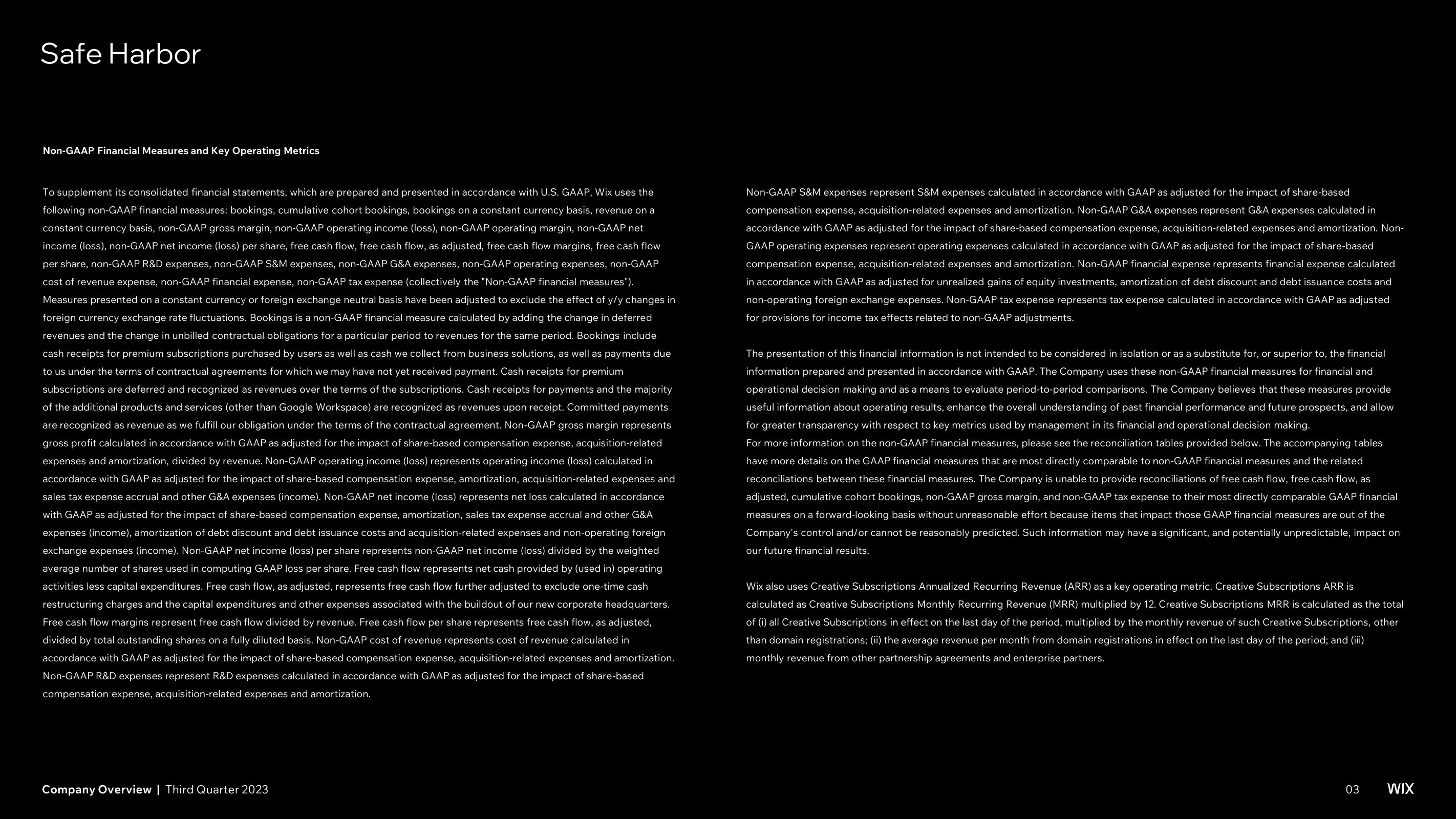Wix Investor Presentation Deck
Safe Harbor
Non-GAAP Financial Measures and Key Operating Metrics
To supplement its consolidated financial statements, which are prepared and presented in accordance with U.S. GAAP, Wix uses the
following non-GAAP financial measures: bookings, cumulative cohort bookings, bookings on a constant currency basis, revenue on a
constant currency basis, non-GAAP gross margin, non-GAAP operating income (loss), non-GAAP operating margin, non-GAAP net
income (loss), non-GAAP net income (loss) per share, free cash flow, free cash flow, as adjusted, free cash flow margins, free cash flow
per share, non-GAAP R&D expenses, non-GAAP S&M expenses, non-GAAP G&A expenses, non-GAAP operating expenses, non-GAAP
cost of revenue expense, non-GAAP financial expense, non-GAAP tax expense (collectively the "Non-GAAP financial measures").
Measures presented on a constant currency or foreign exchange neutral basis have been adjusted to exclude the effect of y/y changes in
foreign currency exchange rate fluctuations. Bookings is a non-GAAP financial measure calculated by adding the change in deferred
revenues and the change in unbilled contractual obligations for a particular period to revenues for the same period. Bookings include
cash receipts for premium subscriptions purchased by users as well as cash we collect from business solutions, as well as payments due
to us under the terms of contractual agreements for which we may have not yet received payment. Cash receipts for premium
subscriptions are deferred and recognized as revenues over the terms of the subscriptions. Cash receipts for payments and the majority
of the additional products and services (other than Google Workspace) are recognized as revenues upon receipt. Committed payments
are recognized as revenue as we fulfill our obligation under the terms of the contractual agreement. Non-GAAP gross margin represents
gross profit calculated in accordance with GAAP as adjusted for the impact of share-based compensation expense, acquisition-related
expenses and amortization, divided by revenue. Non-GAAP operating income (loss) represents operating income (loss) calculated in
accordance with GAAP as adjusted for the impact of share-based compensation expense, amortization, acquisition-related expenses and
sales tax expense accrual and other G&A expenses (income). Non-GAAP net income (loss) represents net loss calculated in accordance
with GAAP as adjusted for the impact of share-based compensation expense, amortization, sales tax expense accrual and other G&A
expenses (income), amortization of debt discount and debt issuance costs and acquisition-related expenses and non-operating foreign
exchange expenses (income). Non-GAAP net income (loss) per share represents non-GAAP net income (loss) divided by the weighted
average number of shares used in computing GAAP loss per share. Free cash flow represents net cash provided by (used in) operating
activities less capital expenditures. Free cash flow, as adjusted, represents free cash flow further adjusted to exclude one-time cash
restructuring charges and the capital expenditures and other expenses associated with the buildout of our new corporate headquarters.
Free cash flow margins represent free cash flow divided by revenue. Free cash flow per share represents free cash flow, as adjusted,
divided by total outstanding shares on a fully diluted basis. Non-GAAP cost of revenue represents cost of revenue calculated in
accordance with GAAP as
for the impact of share-based com sation expense, acquisition-related expenses and amortization.
Non-GAAP R&D expenses represent R&D expenses calculated in accordance with GAAP as adjusted for the impact of share-based
compensation expense, acquisition-related expenses and amortization.
Company Overview | Third Quarter 2023
Non-GAAP S&M expenses represent S&M expenses calculated in accordance with GAAP as adjusted for the impact of share-based
compensation expense, acquisition-related expenses and amortization. Non-GAAP G&A expenses represent G&A expenses calculated in
accordance with GAAP as adjusted for the impact of share-based compensation expense, acquisition-related expenses and amortization. Non-
GAAP operating expenses represent operating expenses calculated in accordance with GAAP as adjusted for the impact of share-based
compensation expense, acquisition-related expenses and amortization. Non-GAAP financial expense represents financial expense calculated
in accordance with GAAP as adjusted for unrealized gains of equity investments, amortization of debt discount and debt issuance costs and
non-operating foreign exchange expenses. Non-GAAP tax expense represents tax expense calculated in accordance with GAAP as adjusted
for provisions for income tax effects related to non-GAAP adjustments.
The presentation of this financial information is not intended to be considered in isolation or as a substitute for, or superior to, the financial
information prepared and presented in accordance with GAAP. The Company uses these non-GAAP financial measures for financial and
operational decision making and as a means to evaluate period-to-period comparisons. The Company believes that these measures provide
useful information about operating results, enhance the overall understanding of past financial performance and future prospects, and allow
for greater transparency with respect to key metrics used by management in its financial and operational decision making.
For more information on the non-GAAP financial measures, please see the reconciliation tables provided below. The accompanying tables
have more details on the GAAP financial measures that are most directly comparable to non-GAAP financial measures and the related
reconciliations between these financial measures. The Company is unable to provide reconciliations of free cash flow, free cash flow, as
adjusted, cumulative cohort bookings, non-GAAP gross margin, and non-GAAP tax expense to their most directly comparable GAAP financial
measures on a forward-looking basis without unreasonable effort because items that impact those GAAP financial measures are out of the
Company's control and/or cannot be reasonably predicted. Such information may have a significant, and potentially unpredictable, impact on
our future financial results.
Wix also uses Creative Subscriptions Annualized Recurring Revenue (ARR) as a key operating metric. Creative Subscriptions ARR is
calculated as Creative Subscriptions Monthly Recurring Revenue (MRR) multiplied by 12. Creative Subscriptions MRR is calculated as the total
of (i) all Creative Subscriptions in effect on the last day of the period, multiplied by the monthly revenue of such Creative Subscriptions, other
than domain registrations; (ii) the average revenue per month from domain registrations in effect on the last day of the period; and (iii)
monthly revenue from other nership agreements and enterprise partners.
03
WIXView entire presentation